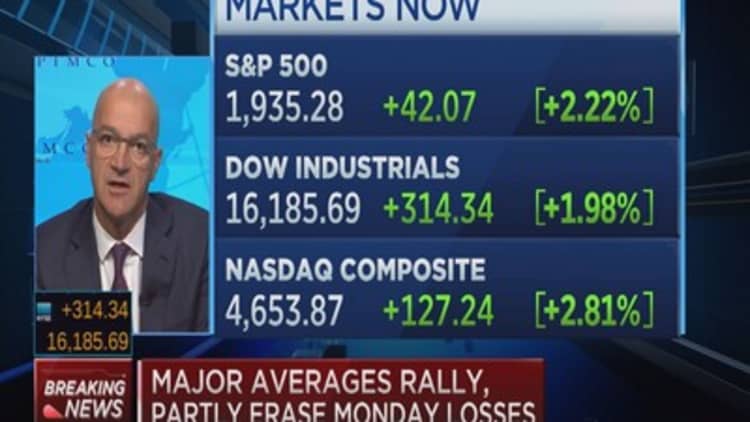
U.S. stocks may be beaten up, but measures taken by China to support growth will stem the bloodletting as the prospect of persistently low interest rates continues to support equities, experts told CNBC on Tuesday.
All major U.S. stock averages entered correction Monday, with the Dow Jones industrial average capping its biggest three-day point loss ever after plunging 1,089 points at the open. However, U.S. stocks rallied 2 percent or better across indexes Tuesday.
While a number of individual stocks have entered a bear market, the overall bull market remains intact, Hank Smith, chief investment officer of Haverford Trust, said Tuesday.
"We do firmly believe this is just a correction. It is nothing more," he told CNBC's "Squawk on the Street." "It's not the beginning of a bear market. Bear markets occur in anticipation of a recession, and there are no signs of a recession in the U.S. going out 12 to 18 months."
The market got "overly emotional" as traders questioned China's growth outlook and policy strategy in the past few days, according to Joachim Fels, global economic advisor at Pimco. However, the People's Bank of China removed much of the uncertainty plaguing investors by cutting both interest rates and reserve ratio requirements in a bid to stimulate lending, he added.
Read More China cuts rates, reserve ratio after stocks plummet again
Tuesday's monetary easing, along with China's controlled devaluation of its currency, signal a return to traditional policy tools, Fels said.
China's surprise decision to allow the yuan to slip in value against the dollar earlier this month sparked concern that policymakers were losing confidence in the economy, but Fels said the move made sense.
"That's much better than intervening directly in equity markets. That was a very unconventional policy that obviously failed," he told "Squawk on the Street," referring to extraordinary measures China took to halt a 30 percent stock market correction in July, including banning selling among large shareholders.
While an earlier rate cut would have been preferable, Fels believes Tuesday's action was only the first in a series of cuts to the reserve ratio, which dictates how much cash banks have on hand.
"If you take all this together—domestic monetary easing, a somewhat weaker currency—I think that will help to put a bottom, a floor under the Chinese economy, and I think that will also help global sentiment," he said.
Read MoreWilbur Ross: Correction is in the 6th inning
As for the prospect of higher U.S. interest rates, Fels acknowledged that the Federal Reserve does not want to surprise markets, but said he believes the central bank will start to normalize rates this year, after a shallow path to a "new neutral" of 2 percent on the federal funds rate.
The Fed has held its benchmark interest rate near zero since December 2008 to encourage lending in the midst of a tepid economic recovery.
Smith said he also expects rates to remain lower for longer, noting that many blue chips stocks are still returning 3 to 4 percent compared with a roughly 2 percent yield on 10-year Treasurys.
"Even when we do get that first rate hike, there is consensus that we agree with that it is not going to be a series of hikes in gradual steps like previous rising cycles. It is going to be one and done for a while," he said. "We're several years more into a low-interest rate environment. I think that will be a good backdrop for the market."


